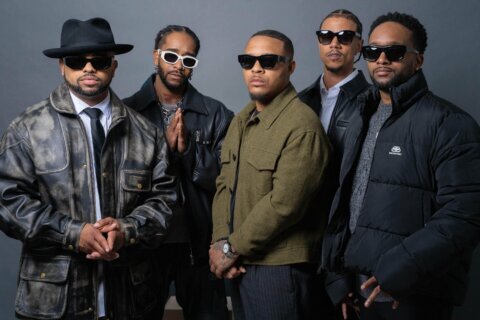WASHINGTON — Like an extraterrestrial bursting out of a human chest, Ridley Scott exploded into movie history with his science-friction masterpiece “Alien” (1979), featuring the greatest of taglines: “In space, no one can hear you scream.”
While the sequels provided killer proving grounds for other filmmakers — James Cameron in “Aliens” (1986), David Fincher in “Alien 3” (1992) and Jean-Pierre Jeunet in “Alien: Resurrection” (1997) — it was exciting to see Ridley Scott resume the reins with the first of his prequel series, “Prometheus” (2012), which remains criminally underrated by many critics who claimed it was too high-minded.
That’s a shame because the backlash likely caused the new installment to go in the opposite direction. “Alien: Covenant” ramps up the body-horror schlock but does so at the expense of more philosophical questions, resulting in an oddly uneven film that squanders the powerful promise of “Prometheus.”
Set in 2104 — 10 years after the events of the last movie — the human colony ship Covenant carries 15 crew members, 1,000 embryos and 2,000 passengers sleeping in stasis in cryogenic pods. These pods are monitored by android Walter (Michael Fassbender), who seeks answers to his own creation.
After a neutrino burst fries the captain (James Franco) in his inescapable pod, the crew debates the best course of action upon hearing a radio transmission from distant planet Origae-6. Newly-minted captain Oram (Billy Crudup) wants to follow the signal in the hopes of finding an Earthlike planet to colonize, while the late captain’s widow Daniels (Katherine Waterston) warns not to veer off course.
While the original “Alien” (1979) thrived on the slow-burn suspense of monster-in-the house horror, “Covenant” suffers from a bit of an identity crisis. It doesn’t even feel like the blockbuster action-adventure of “Aliens” (1986). Instead, “Covenant” tonally feels more like a “Friday the 13th” (1980) slasher flick, putting the “Jason X” in “Xenomorph,” with a series of increasingly grotesque slayings.
One shower sex scene tries too hard to scintillate, as an alien tentacle protrudes between the man’s legs to poke the unsuspecting woman, before slaughtering them both in a bloody mess that would cause Norman Bates to drop his mop. It’s puzzling why the great Ridley Scott would stoop to the low-hanging fruit of genital jokes, but you’ll laugh out loud in the movie theater — and not in a good way.
As the bloody attacks occur time and again, you’ll realize the evolution of film technology is ironically detrimental here. While CGI mapping offers wondrous world-building, it also opens Pandora’s box for digitally-leaping aliens that cheapen a once-gritty franchise where less was more and danger always lurked just off screen. It was far scarier when we saw only glimpses of the alien down dark corridors.
Hollywood always learns the wrong lessons from history. “Jaws” was great precisely because we only saw glimpses of the shark, just as “Alien” was great because we only saw glimpses of the alien. And yet, producers come away with the opposite takeaway: let’s see more of the shark and more of the alien in the sequels. Why is it so hard to maintain the same discipline that made it a hit to begin with?
Likewise, fans will also miss the franchise staple of a strong female protagonist akin to Sigourney Weaver’s Ellen Ripley, voted the American Film Institute’s No. 8 Movie Hero of All Time. It’s a shame “Prometheus” star Noomi Rapace (“The Girl With the Dragon Tattoo”) didn’t return as the resilient heroine Elizabeth Shaw. She was flat-out awesome the last time around, memorably climbing onto an automated surgery table to self-extract a squid-like creature from her abdomen. Full. Body. Shiver.
In “Covenant,” we learn Shaw’s fate, but there’s no one else to pick up the slack. Waterston — with her Demi Moore bob haircut — is supposed to fill that void, but she fades into the background for much of the movie. The same goes for Crudup, who’s set up as the new captain, but doesn’t factor nearly enough into the plot. Even the surrounding crew members are forgettable, as Danny McBride (“Eastbound & Down”) deserved more comic-relief quips like the late Bill Paxton: “Game over, man!”
The closest thing to a main character is Fassbender, who plays both the protagonist (Walter) and the antagonist (David) as different upgrades to the same android model invented by Peter Weyland (Guy Pearce). The dual role offers trippy split-screens, as David teaches Walter to play Marc Streitenfeld’s haunting “Prometheus” theme on a woodwind instrument, then delivers a Fredo kiss of betrayal in the creepiest double display since Jeremy Irons’ twins in David Cronenberg’s “Dead Ringers” (1988).
Unfortunately, the script can’t really decide whether it wants Fassbender to be the main character(s). Screenwriters John Logan and Dante Harper open strong with a fascinating prologue that introduces android David in his Creator’s futuristic home, asking various “meaning of life” questions. From here, Act One is well-written, introducing the Covenant ship in an intriguing setup before delivering an effective catalyst with the neutrino burst, which sparks an intriguing debate scene among the crew.
However, the second we land on the distant planet, Act Two becomes increasingly scattershot. The initial landing sequence deserves more screen time to ramp up the false sense of security before the danger begins to strike. In this case, it’s deadly extraterrestrial powder that swirls into the air and invades the astronauts’ ears like mosquitoes. It’s here that we’re reminded of Scott’s directorial prowess, as his camera plunges inside an astronaut’s ear just like David Lynch in “Blue Velvet” (1986).
As the body count rises, the instantly gratified might cheer in squeamish delight, but the more purist fans will be frustrated by the lack of answers found on this faraway planet. Don’t expect much from mankind’s giant predecessors, The Engineers; you’ll instead have to settle for a quick flashback as to their fate. Likewise, if the film’s goal is to explain the origin of H.R. Giger’s biomechanical beast, surely there’s a less cluttered way to express the evolution from Neomorph to Face Hugger to Xenomorph.
By the time the ship escapes the planet, Act Three feels like a tacked-on finale trying to recreate the monster-in-the-house thrills of the original. In fact, the final half-hour feels like an entirely different movie than the culmination of the journey we’ve been watching up until then. Yes, there are plenty of jolts down the stretch, but we’ve come to expect more from a franchise that’s always thought deeper.
And so, “Covenant” is a noticeable step backward from its predecessor “Prometheus,” which teed up promising possibilities for a prequel series that now seems out of steam — with two more sequels to go before we arrive full circle at the Nostromo. There are plenty of glorious, nostalgic, even thought-provoking moments in “Covenant,” but the sum of these parts is greater than the disjointed whole.
What a stunning turn of events for film buffs. Gazing at the 2017 slate at the start of the year, who could have predicted that the year’s best “Alien” flick wouldn’t belong to Ridley Scott, but rather the imitation of “Life,” which overcame its derivative nature for a tighter, more cohesive space chiller?
Alas, “In space, no one can hear you sigh.”









